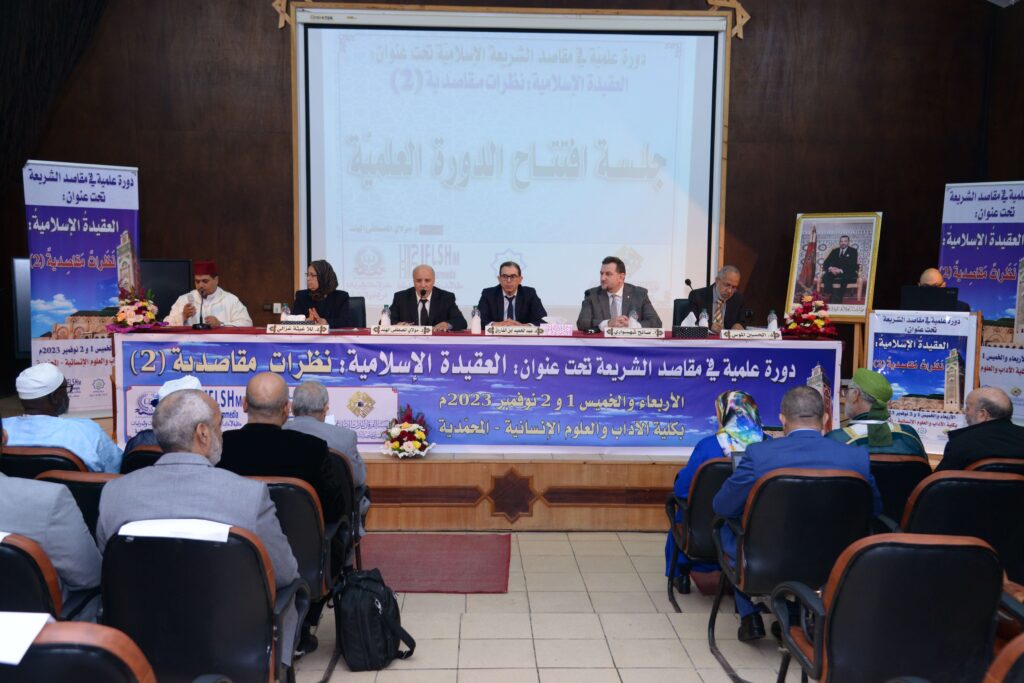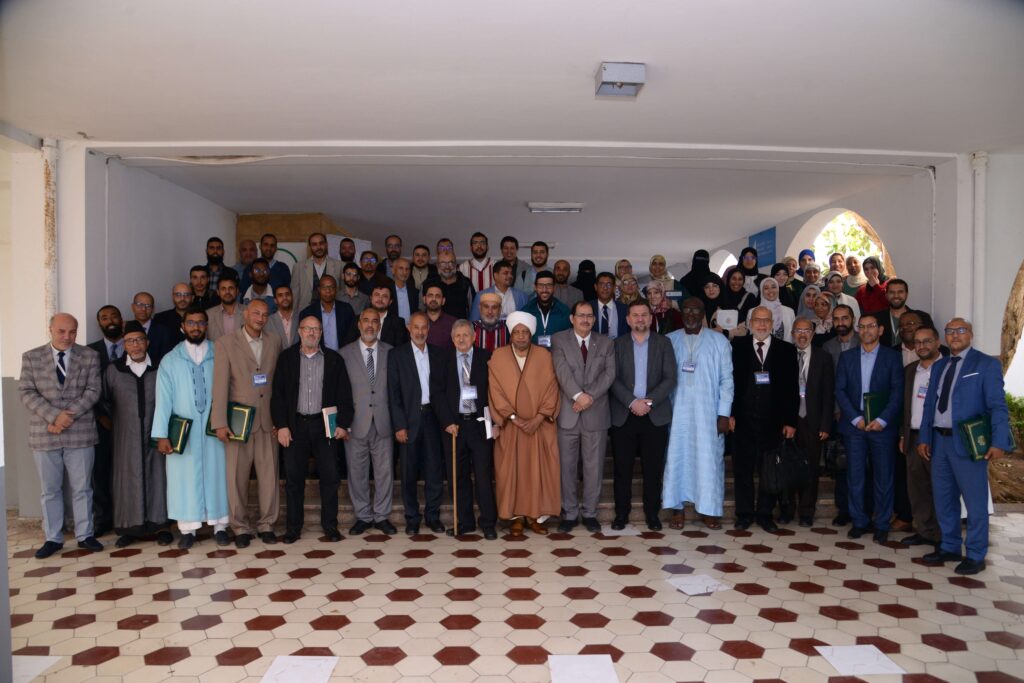In the welcoming environs of the Faculty of Letters & Human Sciences in Mohammedia, Morocco, the Centre for the Study of the Philosophy of Islamic Law at Al-Furqān Islamic Heritage Foundation, the Faculty of Letters & Human Sciences in Mohammedia, the Research and Studies Laboratory in Islamic Sciences of the same Faculty, and the Maqāṣid Research & Studies Centre (Rabat) organised the scientific course, “Islamic creed: Maqāṣid Perspectives (2)”, on 1-2 November 2023CE (16-17 Rabī‘ al-Thānī 1445AH). This was the second scientific course, complementing the first, and aiming to stimulate application of maqāṣid (Islamic law objectives) in the area of Islamic creed.

First Day: Wednesday, 1 November 2023
Instructors, guests, and participants in the training course were received in a pleasant atmosphere.
The course opened with illuminating verses from the Glorious Qur’ān recited by the student, al-Muqri Boujuma. Subsequently, Dr Moulay al-Mustapha al-Hind, chairing the opening session, introduced Abdelhamid Ibn El Farouk, Dean of the Faculty of Letters & Human Sciences in Mohammedia, who delivered a speech welcoming the participating guests, praising the productive collaboration between the organising bodies, and highlighting the importance of the training course topic, due to its current relevance and potential horizons.
On his part, Mr Sali Shahsivari, Managing Director of Al-Furqān Islamic Heritage Foundation in London, expressed his gratitude and welcome for the esteemed scholars, teachers, and students, conveying the greetings of Al-Furqān Foundation’s management, and the Chairman, Mr Sharaf Ahmad Zaki Yamani. He highlighted the importance of this course’s topic requiring a second version, demonstrating the need to complete relevant areas, given the topic’s novelty and viability in the sphere of academic research. He covered the role creed plays in both intellectual and religious domains, so as to preserve the sound innate nature (fiṭrah), and aiming to free faith from all obfuscations and extraneous additions.
Subsequently, the Director of the Research and Studies Laboratory in Islamic Sciences, Dr Lila Ghaythah Ghazali , spoke, welcoming the gathering of scholars, instructors, and students. She emphasised the prominent position enjoyed by, and the importance of studying Islamic creed from the maqāṣid perspective. She further elucidated the importance of moving the study of creed from the theoretical to the applied domain.
The session concluded with the speech by the Director of the Maqāṣid Research & Studies Centre (Rabat), Dr Al-Husayn Al-Mous, who welcomed those present and praised the collaboration between the organising bodies. He also concentrated on illustrating the importance of the topic, which necessitated a second course to complete some critical aspects. He concluded by thanking the Dean, Al-Furqān Foundation’s Managing Director, and all those present.
A tea break in honour of the guests.
The Preliminary Session chaired by Dr Wasfi Ashour Abu Zayd
The preliminary session, chaired by Dr Wasfi Ashour Abu Zayd, addressed “the importance of the training course topic: circumstances and contexts”. This was framed by Dr Abdul Majid al-Najjar and Dr Issam al-Bashir. In his submission, Dr al-Najjar focused principally on explaining that—without exception—a creed ruling exists to secure an interest (maṣlaḥah), objective (maqṣad), and utility (manfa‘ah). He also stated that invoking the objectives (maqāṣid) leads to correct channelling of actions; furthermore, knowledge of the Islamic law objectives is important to elucidate the historical context of practical interests, which protect the believer’s temporal life.
In contrast, Dr Issam al-Bashir considered the topic from the viewpoint of addressing universal imbalances, with respect to the reality where contemporary civilisation dominates; as such, reviving the creed objectives is to put life on a sound footing. Furthermore, he explained that the maqāṣid demonstrate the human being’s function and goal, which complement his human nature; hence, worship and civilising effort (‘umrān) go hand in hand.
A tea break in honour of guests and participants.
First session chaired by Dr Abdul Majid al-Najjar
The session commenced with Dr Abdel Nour Baza’s paper on the “Objectives (maqāṣid) of Divine Acts in their interest (maṣlaḥah) dimensions”. He spoke expansively on some terms used in the paper, namely objectives, Divine Acts, and interests. He also addressed the objectives of Divine Acts relating to creation in their relationship to man and the universe, as well as their interest dimensions. He concluded by discussing the results derived from his examination. The paper was reviewed and commented upon by Dr Mohammad al-Mintar.
Dr Ndiogou Samb presented his paper titled “Objectives of belief in Allāh’s Names (asmā’) and Attributes (ṣifāt)”. He introduced his paper by referring to some previous studies, then dealt with the status of belief in Allāh’s Names and Attributes in Islamic creed. He also tackled the definition of objectives of belief in Allāh’s Names and attributes. He then addressed the general objectives of belief in Allāh’s Names and attributes. Subsequently, Dr Mohamed Sbihi commented on the paper.
Subsequently, the floor opened for discussion.
Second session chaired by Dr Lila Ghaythah Ghazali
In this session, Mr al-Hasan al-Sarrat presented his paper on “Allāh’s Noble Names in Sūrah al-Nisā’: general and specific objectives”. He spoke expansively on the general objectives of the Noble Names in the Quran. He presented all the Noble Names found in the Sūrah, elucidating their general and specific objectives. Dr Rachid Lalama, commented upon this paper.
This was followed by Dr Naziha Maarij’s paper titled “Objectives of belief in transmitted texts (sam‘iyyāt): belief in the Angels as an example”. In her paper, she treated what constituted the Angels, and the corresponding objectives of belief in them, in relation to the five universals. She arrived at a set of important objectives, among them adopting the etiquettes of Angels. Dr Jamila Tilout then provided a commentary on the paper.
Subsequently, Dr Mustafa Qartah presented his paper for which he chose the title, “Objectives of belief in the Prophets and Messengers”. In his paper, he addressed the interests of both the Hereafter and this life, secured through belief in the Prophets and Messengers, of which he mentioned protecting the religion, existing or otherwise, preserving social and international peace, and the Muslim nation’s affirmation of the unity of the religion of all prophets. Afterwards, Dr Yasin al-Salimi commented on the paper.
Following the presentation of these papers and reviews, the floor opened for discussion.
Second Day: Thursday, 2 November 2023
The day’s session opened with a recitation of illuminating verses from the Noble Quran
Third session chaired by Mr Sali Shahsivari
This opened with the paper by Dr al-Hassan Shahid titled “The ethical objectives derived from the creed of prophetic missions”, where he explained the particularisation (takhṣīṣ) of the generality (‘umūm) of objectives contingent on the ethical. He then spoke of particularisation of the generalities of creed as an outcome of prophetic missions. He followed on by speaking about the objective of the selection and dispatch of Prophets, belief and creed, obedience and following their example, and addressing in detail a number of objectives branching from these. Dr Moulay Mustapha al-Hind delivered his commentary on the paper.
This was followed by the paper authored by Dr Abdul Majid al-Najjar on “The objectives of belief in resurrection (al-ba‘th)”. He began by speaking about the aim of religious legislation, namely securing man’s interests. He also asserted that the objectives of creed had not received broad examination, independent of other matters. He then mentioned a number of objectives related to the belief in resurrection, including purification of: the individual, thought, action, the collective, and society through justice.
This was followed by the paper presented by Dr Mahmoud Nimir al-Naffar titled “Objectives of belief in divine decree (al-qaḍā’) and predestination (al-qadar)”. He addressed the concept of objectives relating to belief in divine decree and predestination, as well as the Islamic theological basis of this principle. He also elucidated the related general, specific and partial (juz’ī) objectives; for example, elevating and ennobling the human being, engendering patience, and achieving sound conviction (yaqīn). The commentary on the paper was delivered by Dr Mohamed Aouam.
These papers and commentaries were followed by discussion.
Session four chaired by Dr al-Husayn al-Mous
This opened with the paper by Dr Hamzah al-Nahairi titled “Objectives of belief in divine decree and predestination in Islam: universalities, applications, and effects”, in which he spoke expansively on the objectives of belief in divine decree and predestination in the Quran and Prophetic Sunnah. Moreover, he addressed the objective of belief in predestination and divine decree relating to the human self. He also drew attention to the universals of creed objectives in this area. Dr Ahmad Nasri reviewed, and delivered a commentary on this paper.
Subsequently, Dr Wasfi Ashour Abu Zayd presented his paper on “The efforts of reformers in elucidating the objectives of creed: Muhammad Abduh and Mohammed al-Ghazali as an example”. He began by highlighting the efforts of both men in elucidating the creed objectives. The researcher focused on the issue of monotheism given that it is the highest aim of the Prophetic mission in the view of both men. He also addressed the benefits of creed objectives in their view, such as reforming the human being, reinforcing mental health, drawing comparisons between both men. The review of the paper was delivered by Dr Issam al-Bashir.
This was followed by the paper titled “Objectives-based utilisation of the innate nature (fiṭrah) indicant (dalīl) and the creed problems arising” by Dr Ismail Hafyan. In the paper, he addressed what he called knowledge universals (al-kulliyāt al-ma‘rifiyyah), among them the innate nature, where he set about explaining its meaning. He also set about elucidating the principles, methodology, and effects of objectives-based utilisation of the innate nature indicant. Dr Uthman Kidwar commented upon this paper.
This set of papers and commentaries was followed by discussion.
Closing session chaired by Dr Issam al-Bashir
The scientific course closed with speeches from the organising bodies, delivered by the Vice-Dean on behalf of the Faculty of Letters & Human Sciences, Dr Mohammed Drioueche for Al-Furqān Islamic Heritage Foundation, Dr al-Husayn al-Mous for the Maqāṣid Research & Studies Centre, and Dr Lila Ghaythah Ghazali for the Research and Studies Laboratory in Islamic Sciences at the Faculty. The speeches revolved around expressions of gratitude to all the bodies assisting and participating in the event, from the esteemed Dean and his administrative team, members of the Centre and Laboratory, and the students; furthermore, expressing hope that researchers find what they desire in this training course, which achieved significant success through the papers presented, with the aspiration of greater contribution in future, Allāh willing.


